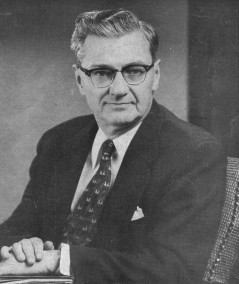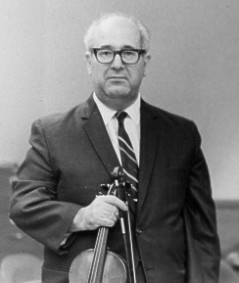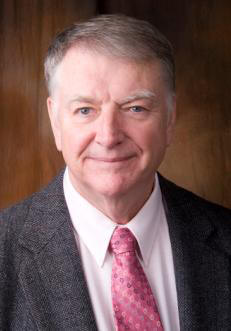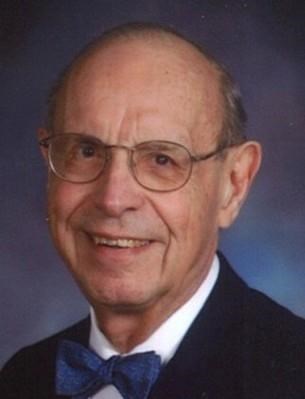Violin I was fortunate to study under two very exceptional violinists during my youth: Robert Louis Barron and John Maltese. Although there is still much biographical information I have still to learn about them, I present here a brief tribute to their memories.
Dr. Robert Louis Barron
(1897-1975)
Mr. John Maltese
(1920-2015)
Robert Barron was born in Benton Harbor, Michigan, on December 7, 1897. As a child, he studied violin under Henry G. Ritz of Detroit. At some point (possibly 1908) his family moved to Chicago, Illinois. In Chicago he studied under Max Fischel, Bernard Listemann, and Harry Diamond. He was concertmaster of the Young People's Symphony Orchestra of Chicago from 1911-13 and made his solo debut at age 14 on April 6, 1912, at the Fine Arts Theater of Chicago, premiering the Earl Drake violin concerto.
Barron made his first U.S. concert tour in 1913-14, giving 163 concerts throughout the country. He received his Master’s degree from Mills College in Oakland, California, on April 6, 1913. He later returned to Chicago and served on the faculty of the Sherwood Music School and worked also at the Max Fischel studio.
Sometime in the late 1910s he moved west, where he settled for several decades. He was known to have given recitals in Eugene, Oregon, on June 4, 1919, and another on March 16, 1920. He taught violin at the University of Oregon in 1918-19. He later was on the music faculty of the College of the Pacific (1928-31) and served as director of the Manning School in San Francisco from 1931-35. By 1940 Barron had moved to Texas where he conducted the Amarillo Philharmonic (1940-48). He was awarded the D.Mus. degree from the Amarillo Conservatory in 1948. The following year he was made conductor of the Arkansas Valley Symphony Orchestra.
Sometime in the 1950s he moved to Anniston, Alabama, where he conducted the Northeast Alabama Symphony Orchestra and taught music history at Jacksonville State College (now University). When the orchestra folded Barron retired from conducting and concertizing and taught in a private studio in Anniston. He gave his farewell recital in Anniston on April 23, 1966.
Dr. Barron died in Anniston on October 23, 1975, after a lengthy illness.
I studied under Dr. Barron from 1963-69. Among the many things I remember his telling me through the years was that he also studied under Carl Flesch, a fact also mentioned in a newspaper article prior to his farewell recital. From the many reviews I have accessed it is a fact that Robert Barron was one of the preeminent violinists of his day in the United States. I really wish he had made some recordings during his heyday, but to my knowledge none exist.
John Maltese was born in Trapani, Sicily, on February 19, 1920, and immigrated to America with his parents a year later. Exhibiting a remarkable talent on the violin from an early age, he studied at Juilliard after completing his high school education.
He put his musical studies on hold, however, during the Second World War and served in the U.S. Navy aboard the USS Caliente. When the war ended he resumed his studies and earned a Master’s degree from the Manhattan School of Music.
For several years afterward he engaged in performance and played for three presidents while serving as violinist in a string ensemble. He also played in recording orchestras for many notable popular musicians of the era, including Perry Como, among others.
Maltese later became a college professor — a career that spanned 35 years. I was fortunate to have studied under him at Jacksonville State University in Jacksonville, Alabama, during the early 1970s where his style of teaching (which encompassed patience, compassion, and a deep love of music) became a pattern I endeavor to emulate in my own teaching to this day.
In addition to his performance and pedagogical careers, Maltese was known worldwide for his collection of historic recordings, particularly those of his idol, Jascha Heifetz. He is believed to have possessed the only complete collection of all Heifetz recordings ever made, including some very rare private recordings not even in Heifetz’ own possession. For his work on a comercial collection of Heifetz recordings, he and his son John were given a Grammy Award in 1996. The two also were responsible for rediscovering and having issued on commercial CD the famous, and believed to be lost, Julius Block cylinders from late 19th-century Russia.
I was privileged to study both violin and music theory under Mr. Maltese while I was a student at Jacksonville State University.
At the time of his death on October 11, 2015, in Athens, Georgia, he and his son were near completion of a new biography of Jascha Heifetz, which his son intends to complete in his honor.
R.L. Barron, 14 years old, 1912
R.L. Barron, ca. 1930
John Maltese, ca. 1933
John Maltese, 1970
Theory & Composition
Dr. Gerald L. Moore
(1939-2010)
Dr. Henry Fusner
(1923-2015)
Gerald Moore was born in Dallas, Texas on February 2, 1932. He received his Bachelor of Music and B.M.E. degrees from North Texas State University, and his doctorate from the University of Oklahoma. After serving in the U.S. Army, he joined the faculty of David Lipscomb College (now University) from 1970-77 and then again from 1981 until his retirement in 2006. During his time at Lipscomb he formed the Lipscomb Early Music Consort and taught music theory and other related subjects. He also served as the director of the Jazz Vocal Ensemble and the Lipscomb Chorale. After retirement, Dr. Moore founded and directed the Nashville Early Music Ensemble and became co-director of the Nashville Double Reeds. He worked as editor and arranger of a number of works ranging from settings of Shakespearen-era music to Native American songs. He also was a prominent member of the American Recorder Society, which published several of his arrangements.
Even after retiring from full-time instruction, Dr. Moore continued as an adjunct professor of music until his death, and as always he remained open to giving advice and counsel to former students and colleagues.
I was privileged to have studied under Dr. Moore during my years as a student at David Lipscomb College, and to have performed regularly with his Early Music Consort. Like all my other teachers, Dr. Moore exhibited infinite patience and compassion, providing instruction without being in any way a harsh taskmaster.
Dr. Moore died suddenly in Nashville, Tennessee, on February 11, 2010, just nine days after his 78th birthday.
Henry Fusner was born in 1923 in Parkersburg, West Virginia. He earned both his bachelor's and master's degrees in music from Juilliard and his doctorate from Union Theological Seminary. Among his many notable teachers were Gaston Dethier, Peter Wilhousky, Vittorio Gianini, and Normand Lockwood. He also studied organ under Clarence Dickinson. Throughout most of his career he held church positions overseeing numerous music programs. These included the Church of St. Edward the Martyr in Manhattan and Emmanuel Baptist in Brooklyn. In 1956 he moved to Cleveland, Ohio, to be organist and choirmaster at the Church of the Covenant and also joined the faculty of the Cleveland Institute of Music. He later relocated to Nashville, Tennessee, to assume directorship of music at the First Presbyterian Church. In Nashville he continued his teaching activities at the Blair School of Music at Vanderbilt University and also privately.
Responsible for all music programs at First Presbyterian, it was here that he staged a production of the liturgical drama The Play of Daniel in 1973. Additionally, he organized a number of organ recitals at the church, featuring several well-known performers, and served as organist and choirmaster there until his retirement.
I first made Dr. Fusner’s acquaintance when I was selected to play rebec in his production of The Play of Daniel, and I subsequently took theory and composition lessons from him privately. I found him to be an incredibly knowledgeable musician who, like the other instructors I was honored to know, exhibited great patience with a wayward student.
Confined to a nursing facility for the last few years of his life, Dr. Fusner passed away on February 2, 2015, in Nashville, Tennessee, where he had made his home since 1970.





